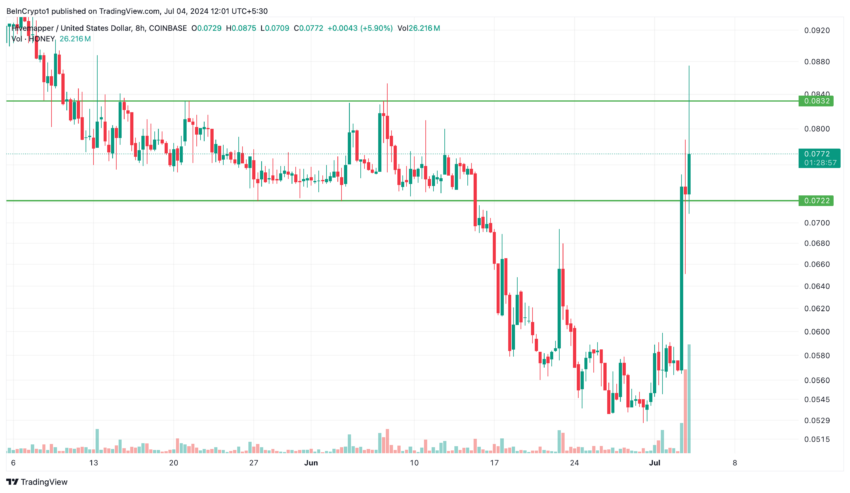Decentralized physical infrastructure network (DePin) startup Hivemapper’s HONEY token has surged by over 30% in the last 24 hours. Despite Bitcoin plummeting to a two-month low of $57,800 earlier today, HONEY emerged as one of the top gainers on CoinGecko.
This impressive rally was significantly influenced by its recent listing on Kraken, one of the leading cryptocurrency exchanges.
How Can Hivemapper’s HONEY Token Sustain Its Rally?
Kraken announced its decision to list the HONEY token on July 2, and trading commenced the following day. This development seems to have catalyzed the token’s sharp increase in value.
Earlier today, HONEY reached $0.0875, marking its highest value since May 13. Following this peak, however, the token experienced a 10% drop and is currently trading near $0.0772. This retraction likely stems from investors taking profits amidst the rapid price increase.
HONEY needs to close above the resistance level of $0.0832 to sustain its upward momentum. Moreover, it needs to consistently stay above the support level of $0.0722. If it fails to maintain these levels, the token risks losing its recent gains and potentially reverting to previous price levels.
Nonetheless, HONEY is still more than 85% below its peak price in January.
Read more: What Is DePIN (Decentralized Physical Infrastructure Networks)?

Hivemapper, which backs the HONEY token, operates a decentralized mapping network that employs artificial intelligence (AI) and crowdsourced data to create a global map. This platform differs from traditional services because it uses dashcams and mobile phone telemetry, allowing personal and enterprise decentralized applications (dApps) to access current geolocation data.
Notably, Hivemapper’s data collection and expansion rate is significantly faster than traditional mapping services like Google Maps. On June 27, BeInCrypto reported that Hivemapper’s map database expands four to five times quicker than Google’s. This advantage is largely due to its strategy of incentivizing contributors.
Ariel Seidman, co-founder of Hivemapper, praises the company’s unique contributor engagement strategies for the network’s growth. For example, an early adopter named Brad bought 100 Hivemapper dashcams and distributed them to Uber and Lyft drivers, sharing his earned HONEY tokens with them. This strategy significantly expanded the network’s reach and effectiveness.
“So that really helped the network grow because he was identifying the right kind of drivers. He had the capital. A lot of Uber drivers may not have the capital. So that was one really clever example,” Seidman said.
Read more: Top 7 Projects on Solana With Massive Potential
Despite these successes, challenges remain. According to a report by Franklin Templeton, while Hivemapper has successfully mapped 21% of the world’s roads in just 31 months, it struggles with the demand side of its operations. The project has not seen proportional growth in demand compared to the supply of mapping data, which could lead to an inflated token supply and consequent devaluation.
Decentralized physical infrastructure network (DePin) startup Hivemapper’s HONEY token has surged by over 30% in the last 24 hours. Despite Bitcoin plummeting to a two-month low of $57,800 earlier today, HONEY emerged as one of the top gainers on CoinGecko.
This impressive rally was significantly influenced by its recent listing on Kraken, one of the leading cryptocurrency exchanges.
How Can Hivemapper’s HONEY Token Sustain Its Rally?
Kraken announced its decision to list the HONEY token on July 2, and trading commenced the following day. This development seems to have catalyzed the token’s sharp increase in value.
Earlier today, HONEY reached $0.0875, marking its highest value since May 13. Following this peak, however, the token experienced a 10% drop and is currently trading near $0.0772. This retraction likely stems from investors taking profits amidst the rapid price increase.
HONEY needs to close above the resistance level of $0.0832 to sustain its upward momentum. Moreover, it needs to consistently stay above the support level of $0.0722. If it fails to maintain these levels, the token risks losing its recent gains and potentially reverting to previous price levels.
Nonetheless, HONEY is still more than 85% below its peak price in January.
Read more: What Is DePIN (Decentralized Physical Infrastructure Networks)?

Hivemapper, which backs the HONEY token, operates a decentralized mapping network that employs artificial intelligence (AI) and crowdsourced data to create a global map. This platform differs from traditional services because it uses dashcams and mobile phone telemetry, allowing personal and enterprise decentralized applications (dApps) to access current geolocation data.
Notably, Hivemapper’s data collection and expansion rate is significantly faster than traditional mapping services like Google Maps. On June 27, BeInCrypto reported that Hivemapper’s map database expands four to five times quicker than Google’s. This advantage is largely due to its strategy of incentivizing contributors.
Ariel Seidman, co-founder of Hivemapper, praises the company’s unique contributor engagement strategies for the network’s growth. For example, an early adopter named Brad bought 100 Hivemapper dashcams and distributed them to Uber and Lyft drivers, sharing his earned HONEY tokens with them. This strategy significantly expanded the network’s reach and effectiveness.
“So that really helped the network grow because he was identifying the right kind of drivers. He had the capital. A lot of Uber drivers may not have the capital. So that was one really clever example,” Seidman said.
Read more: Top 7 Projects on Solana With Massive Potential
Despite these successes, challenges remain. According to a report by Franklin Templeton, while Hivemapper has successfully mapped 21% of the world’s roads in just 31 months, it struggles with the demand side of its operations. The project has not seen proportional growth in demand compared to the supply of mapping data, which could lead to an inflated token supply and consequent devaluation.





